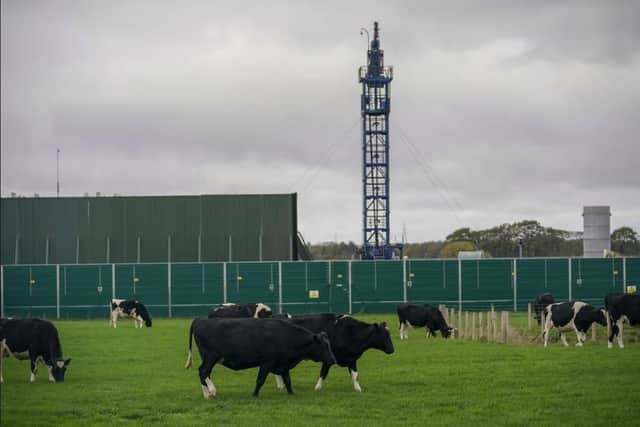Fracking ban to be lifted in bid to ‘bolster energy security’ despite manifesto pledge, Government announces
and live on Freeview channel 276
The ban on fracking in England is set to be lifted, the Government has announced.
A moratorium on drilling for shale gas has been in place since 2 November 2019.
Advertisement
Hide AdAdvertisement
Hide AdThe ban was introduced on the basis of a report by the Oil and Gas Authority (OGA), which found that it is not currently possible to accurately predict the probability or magnitude of earthquakes linked to fracking operations.
However Business and Energy Secretary Jacob Rees-Mogg announced plans to lift the ban.
Here is all you need to know:
Why is the fracking ban being lifted?
The Government has confirmed it is lifting the moratorium on fracking in England, arguing it will help bolster energy security following Vladimir Putin’s invasion of Ukraine.
Business and Energy Secretary Jacob Rees-Mogg said: “In light of Putin’s illegal invasion of Ukraine and weaponisation of energy, strengthening our energy security is an absolute priority, and – as the Prime Minister said – we are going to ensure the UK is a net energy exporter by 2040.
Advertisement
Hide AdAdvertisement
Hide Ad“To get there we will need to explore all avenues available to us through solar, wind, oil and gas production – so it’s right that we’ve lifted the pause to realise any potential sources of domestic gas.”


Government will now accept fracking applications
The Department for Business, Energy and Industrial Strategy (BEIS) said lifting the ban meant future applications will be considered “where there is local support”.
Developers will need to have the necessary licences, permissions and consents in place before they can commence operations.
The Government also published the British Geological Survey’s scientific review into shale gas extraction, which was commissioned earlier this year.
Advertisement
Hide AdAdvertisement
Hide AdBEIS said the review “recognised that we have limited current understanding of UK geology and onshore shale resources, and the challenges of modelling geological activity in relatively complex geology sometimes found in UK shale locations”.
The Government argued that the limited understanding should not be a barrier to fracking, but instead a reason to drill more wells to gather more data.
“It is clear that we need more sites drilled in order to gather better data and improve the evidence base, and we are aware that some developers are keen to assist with this process,” a BEIS statement said.
“Lifting the pause on shale gas extraction will enable drilling to gather this further data, building an understanding of UK shale gas resources and how we can safely carry out shale gas extraction in the UK where there is local support.”
What did the Tories pledge in 2019 manifesto?
Advertisement
Hide AdAdvertisement
Hide AdThe 2019 Conservative manifesto pledged not to lift England’s moratorium unless fracking was scientifically proven to be safe amid concerns over earthquakes.
A British Geological Survey review into its safety was commissioned, but its publication was delayed by the Queen’s death.
Officials have suggested it will show more drilling is required to establish data on the impact of extraction on earthquakes.
The document is expected to be published on Thursday (22 September) as the Government sets out how it will end the fracking ban.
Advertisement
Hide AdAdvertisement
Hide AdMr Rees-Mogg told BBC Newsnight yesterday (21 September): “The seismic limits will be reviewed to see a proportionate level. 0.5 on the Richter scale, which is only noticeable with sophisticated machinery, it is quite right that fracking would not take place, that level is too low.
“But I can’t confirm a new level, because that is being looked at.”
Lifting of fracking ban faces criticism
Environmental groups hit out at the move to lift the ban, with Greenpeace energy security campaigner Philip Evans warning fracking was “a dud”.
“As energy experts keep telling ministers, drilling for more fossil fuels – whether it’s fracking or North Sea oil and gas – will not lower bills, make us less dependent on volatile fossil fuel markets or cut our carbon emissions.
Advertisement
Hide AdAdvertisement
Hide Ad“And fracking may not even work at all. Even when the Government went ‘all out for shale’, the frackers produced no energy for the UK but managed to create two holes in a muddy field, traffic, noise and a colossal amount of controversy,” he said.
Mr Evans urged the Prime Minister to look at the “tried and tested” solutions to lower bills and boost energy security – renewables and upgrading energy efficiency in homes.
Friends of the Earth campaigner Danny Gross said fracking was the most unpopular and least effective way of generating energy in the UK, was opposed by communities wherever it was tried, and any attempt to water down the rules that safeguarded against the process would “only fuel its unpopularity”.
“If Liz Truss wants to build a strong economy for the future, she should champion home insulation and the UK’s plentiful renewable resources. They are cheap, quick to develop and are popular with the public,” he said.
Government to offer more oil and gas licenses
Advertisement
Hide AdAdvertisement
Hide AdThe Government also announced today a new oil and gas licensing round, expected to be launched by the North Sea Transition Authority in early October.
This is expected to lead to more than 100 new licences being granted to search for oil and gas in the North Sea.
Comment Guidelines
National World encourages reader discussion on our stories. User feedback, insights and back-and-forth exchanges add a rich layer of context to reporting. Please review our Community Guidelines before commenting.